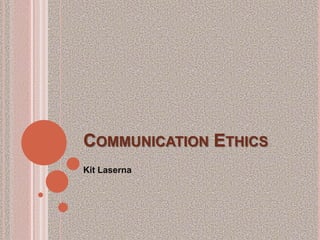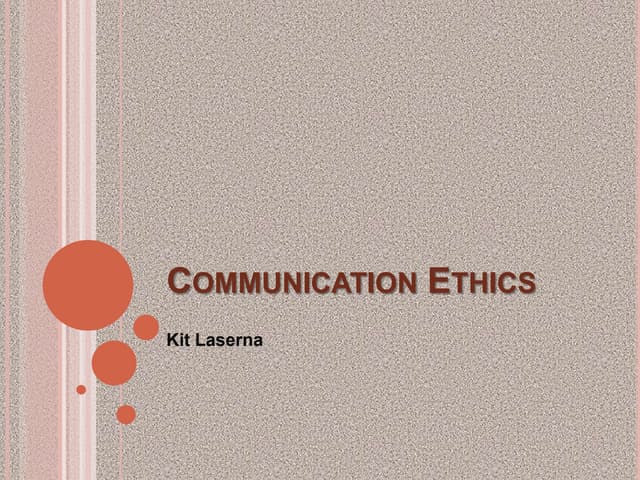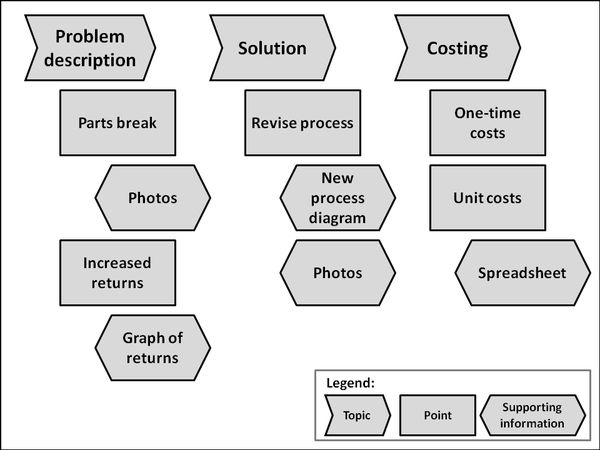Communication Ethics Definition
Communication ethics refers to the moral principles that guide ethical communication practices. It involves honest, clear, and respectful communication.
In today’s interconnected world, where communication plays a crucial role in various aspects of life, including business, relationships, and media, it is essential to uphold communication ethics to maintain trust and promote positive interactions. Effective communication requires ethical considerations such as truthfulness, integrity, confidentiality, and respect for diversity.
By adhering to communication ethics, individuals and organizations can create an environment that fosters open and meaningful dialogue, enhances understanding, and promotes ethical decision-making. It is crucial to prioritize communication ethics to ensure responsible and ethical communication in all settings.
Understanding Communication Ethics
Understanding communication ethics is crucial in today’s world, as it defines the principles and values that guide ethical communication. It helps us navigate through the complex issues of privacy, truthfulness, and responsibility in our interactions with others.
What Are Communication Ethics And Why Are They Important?
Communication ethics refers to the moral principles and values that guide our communication behaviors and decisions. It involves ensuring that our interactions with others are honest, respectful, and responsible. In today’s fast-paced and interconnected world, effective communication ethics are more crucial than ever.
They are important for several reasons:
- Trust-building: Communication ethics are essential for building trust and credibility in relationships, both personal and professional. When we communicate ethically, we demonstrate our sincerity and reliability, which helps in fostering stronger connections.
- Respectful interactions: Ethical communication promotes respectful and inclusive interactions. It encourages us to listen actively, value diverse opinions, and engage in fair discussions. By practicing communication ethics, we can create a culture of mutual respect and understanding.
- Avoidance of misunderstandings and conflicts: Ethical communication includes clear and accurate messages, which reduces the chances of misunderstandings. When we communicate ethically, we focus on effective expression and active listening, minimizing the conflicts that may arise due to miscommunication.
- Positive impact on society: Ethical communication extends beyond individual relationships and has a broader impact on society. It involves considering the consequences of our communication choices and striving for fairness, truthfulness, and empathy. Ethical communicators contribute to a healthier social environment where information is reliable and people can rely on open and transparent communication.
- Personal and professional growth: Practicing communication ethics can have a positive impact on personal and professional growth. It helps us develop empathy, emotional intelligence, and effective communication skills. These qualities are highly valued in the workplace and can enhance our career prospects and overall well-being.
To sum up, communication ethics are the principles that guide our communication choices and behaviors. They are important for building trust, promoting respect, avoiding conflicts, making a positive societal impact, and fostering personal and professional growth. By prioritizing ethical communication, we can create stronger connections, meaningful conversations, and a more harmonious society.
Navigating Ethical Dilemmas In Communication
Communication ethics is the foundation of navigating ethical dilemmas in the field of communication. It involves making decisions that are morally and ethically responsible while respecting the rights and considerations of all parties involved.
Earning trust and building strong relationships are at the foundation of effective communication. However, there are often ethical dilemmas that challenge this premise and put our integrity to the test. In this section, we will delve into the crucial aspect of ethical decision-making in difficult communication situations.
Let’s explore how we can navigate these ethical dilemmas and uphold our values.
Identifying Common Ethical Issues In Communication
Being aware of the common ethical issues in communication is the first step towards handling them effectively. Some of these issues include:
- Confidentiality breaches: Sharing sensitive information without consent.
- Deception: Deliberately misleading or manipulating others.
- Conflict of interest: Prioritizing personal gains over the well-being of others.
- Cultural insensitivity: Failing to respect cultural differences and norms.
- Misrepresentation: Presenting false or misleading information.
The Importance Of Ethical Decision-Making In Difficult Situations
Making ethical decisions in challenging communication situations is essential for several reasons:
- Upholding credibility: Acting ethically preserves our reputation and maintains trust with others.
- Cultivating healthy relationships: Ethical decision-making fosters open communication, respect, and understanding.
- Avoiding legal consequences: Ethical behavior ensures compliance with laws and regulations.
- Fostering long-term success: Making ethical decisions adds value to our personal and professional growth.
Strategies For Resolving Ethical Dilemmas In Communication
When faced with ethical dilemmas in communication, it’s crucial to have strategies in place to resolve them effectively. Consider the following approaches:
- Consult colleagues or mentors: Seek guidance from trusted individuals who can provide a fresh perspective on the situation.
- Evaluate consequences: Analyze the potential outcomes of different courses of action and choose the one that aligns with ethical principles.
- Emphasize transparency and honesty: Maintain open and truthful communication to build trust and credibility.
- Reflect on personal values: Assess how your own values align with the situation and use them as a guide for decision-making.
- Take responsibility: Acknowledge any mistakes or missteps and take appropriate actions to rectify the situation.
Remember, ethical decision-making is an ongoing process that requires self-awareness, empathy, and a commitment to acting in the best interest of others. By navigating ethical dilemmas in communication with integrity, we can build stronger connections and contribute to a more ethical world.
Ethical Communication In Different Contexts
Effective communication is crucial in various settings, emphasizing the importance of ethical communication. It involves the responsible and respectful exchange of information to promote understanding and trust among individuals, organizations, and communities. Understanding communication ethics is essential for maintaining ethical standards and fostering positive relationships in different contexts.
Ethics In Interpersonal Communication
- Honesty: Being truthful and transparent in communicating with others ensures that ethical standards are upheld. It involves sharing accurate information and avoiding any form of deception.
- Respect: Showing respect for individuals’ thoughts, feelings, and opinions is essential. It entails listening actively, valuing diverse perspectives, and refraining from disrespectful language or behavior.
- Openness: Maintaining open and sincere communication fosters trust and ethical interaction. It involves sharing information appropriately and being receptive to feedback and different viewpoints.
Ethics In Organizational Communication
- Confidentiality: Respecting the privacy and confidentiality of sensitive information within an organization is paramount. This includes upholding obligations regarding employee personal data, proprietary business data, and trade secrets.
- Accuracy: Communicating information accurately and factually is a cornerstone of ethical organizational communication. Avoiding exaggeration, false claims, and misleading statements is crucial to maintaining credibility.
- Inclusivity: Promoting an inclusive and diverse workplace by ensuring all employees have equal opportunities to express their opinions and ideas fosters ethical organizational communication. It involves avoiding discrimination, bias, or exclusionary practices.
Ethics In Digital And Online Communication
- Privacy and Security: Safeguarding personal information and data privacy is essential in digital communication. Ethical practices include using secure channels, protecting user data, and obtaining consent for data collection.
- Transparency: Providing clear and honest information about online activities and practices helps maintain ethical digital communication. This includes disclosing affiliation or sponsorship, labeling advertisements, and informing users about data usage.
- Respectful Engagement: Being respectful and mindful of others when engaging online is an important aspect of ethical digital communication. This involves avoiding cyberbullying, hate speech, or any form of online harassment.
Remember, ethical communication forms the foundation of trust and fosters positive relationships in various contexts. Whether it’s in interpersonal, organizational, or digital communication, ethics should guide our actions and interactions to promote a fair and respectful exchange of information and ideas.
Maintaining Ethical Standards In Interpersonal Communication
Maintaining ethical standards in interpersonal communication entails upholding moral principles and values in all forms of interaction between individuals. It involves adhering to honesty, respect, transparency, and accountability to ensure effective and ethical communication.
The Importance Of Honesty, Respect, And Empathy
In maintaining ethical standards in interpersonal communication, it is crucial to uphold values such as honesty, respect, and empathy. By adhering to these principles, individuals can foster healthy and meaningful relationships while ensuring effective communication. Here are the key points to consider:
- Honesty:
- Being truthful and transparent in our interactions builds trust and credibility.
- Honesty fosters open communication, allowing for genuine understanding between individuals.
- It helps to avoid misunderstandings and promotes ethical behavior in all aspects of communication.
- Respect:
- Respecting others’ opinions, beliefs, and boundaries creates an environment of trust and openness.
- Active listening and valuing diverse perspectives demonstrate respect in communication.
- Being mindful of cultural differences and personal boundaries is essential in maintaining respectful interactions.
- Empathy:
- Understanding and acknowledging the feelings and experiences of others show empathy.
- Empathy improves relationships by fostering compassion and creating a safe space for dialogue.
- It encourages active engagement and helps build bridges between individuals with different views.
Maintaining these ethical values not only promotes healthy communication but also enhances overall well-being and understanding in personal and professional relationships.
Building Trust And Credibility In Relationships
Building trust and credibility is essential for effective communication and establishing strong relationships. Consider the following points when aiming to foster trust and credibility:
- Consistency:
- Consistently behaving in alignment with one’s words builds trust.
- Regular and reliable communication promotes credibility as it demonstrates commitment.
- Reliability:
- Following through on commitments and meeting expectations enhances trust.
- Being dependable and punctual allows others to rely on your words and actions.
- Transparency:
- Sharing information openly and honestly cultivates trust.
- Avoiding hidden agendas or withholding relevant information helps create a trustworthy image.
- Active Listening:
- Actively engaging in conversations, showing interest, and demonstrating understanding conveys credibility.
- Paying attention to non-verbal cues and providing thoughtful responses exhibits a genuine commitment to the relationship.
By consistently practicing these behaviors, individuals can establish trust and credibility, enabling effective communication and strengthening their relationships.
Ethical Considerations In Difficult Conversations And Conflicts
Navigating difficult conversations and conflicts requires ethical considerations to ensure respectful and constructive dialogue. Here are some points to keep in mind during such situations:
- Understand perspectives:
- Empathetically acknowledge and seek to understand the viewpoints of others involved.
- Recognize the diversity of perspectives and approach conversations with an open mind.
- Maintain respect:
- Engage in respectful dialogue, refraining from personal attacks or derogatory language.
- Treat others with dignity and avoid escalating conflicts through aggression.
- Active communication:
- Communicate assertively, expressing concerns and emotions while being mindful of the impact on others.
- Encourage open dialogue by actively listening and valuing alternate opinions.
- Seek resolution:
- Strive for collaborative problem-solving, focusing on finding mutually beneficial solutions.
- Prioritize understanding over winning, aiming for resolution rather than escalating conflict.
- Practice self-awareness:
- Recognize and manage personal biases, ensuring fair consideration and avoiding discrimination.
- Reflect on one’s own communication style and adjust as needed to promote ethical dialogue.
By adhering to these ethical considerations during difficult conversations and conflicts, individuals can maintain the integrity of their relationships and work towards constructive resolutions.
Promoting Ethical Communication In Organizations
Promote ethical communication in organizations by defining communication ethics. Ensure all interactions are honest, transparent, and respectful, fostering a positive and productive work environment.
The Role Of Leadership In Fostering An Ethical Communication Culture
Leadership plays a crucial role in establishing and nurturing an ethical communication culture within organizations. Here are some key aspects of leadership’s responsibility in promoting ethical communication:
- Setting the tone: Leaders should lead by example and communicate in an honest, transparent, and respectful manner. By doing so, they create a culture that encourages ethical behavior in communication.
- Creating open channels: Effective leaders ensure that communication channels are accessible and encouraged at all levels of the organization. This promotes open dialogue, encourages feedback, and helps address any ethical concerns or issues promptly.
- Providing clear guidelines: Leadership should establish clear guidelines and policies for ethical communication, outlining expected behaviors, confidentiality, and retaliation-free reporting mechanisms. These guidelines help guide employees in their communication practices and promote ethical conduct.
- Offering training and development: Leaders should invest in communication training and development programs that focus on ethical communication. This equips employees with the necessary skills and knowledge to engage in ethical communication practices and handle difficult situations effectively.
Ethics In Employee Communication And Engagement
Ethics in employee communication and engagement are vital for fostering a healthy and ethical work environment. Here are some essential aspects to consider:
- Transparency and honesty: Organizations should prioritize open and honest communication, encouraging employees to speak up, ask questions, and provide feedback without fear of retribution. This promotes trust and fosters a culture of ethical communication.
- Respecting diversity and inclusivity: Ethical communication ensures that all employees, regardless of their background or characteristics, are treated with respect and dignity. Promoting inclusive communication practices enhances employee engagement and creates a sense of belonging.
- Maintaining confidentiality: Respecting confidentiality is crucial to ensure trust in employee communication. Employers should establish clear guidelines regarding the handling of confidential information, creating an environment where employees feel safe sharing sensitive information.
- Active listening: Ethical communication involves active listening and empathy. Organizations should promote a culture where employees feel heard and understood, fostering mutual respect and open dialogue.
Strategies For Addressing Unethical Behavior In The Workplace
Addressing unethical behavior in the workplace is essential to maintain a healthy work environment and ethical communication practices. Here are some strategies organizations can employ:
- Promoting a culture of ethical behavior: Organizations should prioritize creating a culture that values and rewards ethical behavior. This is achieved through setting clear expectations, recognizing and celebrating ethical conduct, and holding individuals accountable for unethical actions.
- Establishing reporting mechanisms: It is crucial to provide employees with safe and confidential channels to report unethical behavior. This empowers employees to come forward with their concerns, ensuring unethical behavior can be addressed promptly.
- Investigating and addressing concerns: When unethical behavior is reported, organizations should conduct thorough investigations to assess the validity of the concerns. If misconduct is confirmed, appropriate actions, such as disciplinary measures or training programs, should be taken to rectify the situation.
- Regular ethics training: Offering regular ethics training programs helps reinforce ethical behavior expectations, educate employees on potential ethical dilemmas, and provide guidance on handling such situations. This proactive approach can prevent unethical behavior from occurring.
- Leading by example: Leaders should demonstrate a commitment to ethical behavior and serve as role models for the entire organization. Their actions should align with the ethical standards they promote, inspiring employees to follow suit.
By adopting these strategies and fostering a culture of ethical communication, organizations can create an environment that values integrity, trust, and respect, leading to better employee engagement and overall organizational success.
Ethical Considerations In Digital And Online Communication
Digital and online communication presents several ethical considerations that require careful attention. Communication ethics, also known as the guidelines for moral and responsible online interaction, define the standards by which individuals and organizations should adhere to when engaging in digital communication.
These guidelines, such as respecting privacy, promoting transparency, and avoiding misinformation, are crucial in maintaining ethicality in the online world.
The Impact Of Social Media On Communication Ethics
- Social media has revolutionized the way we communicate, but it also poses new ethical challenges. Here are the key considerations:
- Privacy concerns: Social media platforms collect and store vast amounts of personal data, which raises concerns about privacy breaches and misuse of information.
- Spread of misinformation: The ease of sharing content on social media has led to the rapid spread of fake news, rumors, and unverified information, impacting the ethics of communication.
- Cyberbullying and harassment: Social media has created new avenues for cyberbullying and online harassment, highlighting the need for ethical guidelines to protect users.
- Authenticity and accountability: With the rise of influencers and sponsored content, maintaining authenticity and accountability in online communication has become crucial.
Ethical Practices In Online Advertising And Marketing
- Advertising and marketing in the digital sphere require careful consideration of ethical practices. Here are some key points to keep in mind:
- Transparency in sponsored content: It’s essential for advertisers and influencers to clearly disclose any affiliations or sponsorships to maintain transparency and avoid misleading consumers.
- Targeted advertising and data collection: While targeted ads can enhance user experience, ethical concerns arise when personal data is collected without consent or used to manipulate user behavior.
- Honesty and integrity in marketing claims: Truthfulness in advertising and making honest claims about products or services is crucial to establish trust with consumers.
- Respect for user privacy: Marketers must respect user privacy by obtaining consent for data collection, ensuring secure storage, and providing opt-out options.
Balancing Privacy And Transparency In Digital Communication
- Achieving a balance between privacy and transparency is a key ethical consideration in digital communication. Consider the following aspects:
- Clear privacy policies: Organizations communicating digitally should provide transparent privacy policies that outline how user data is collected, stored, and used, helping users make informed decisions.
- Consent and data control: Users should have control over their personal data and the ability to grant or revoke consent for its usage, ensuring their privacy rights are respected.
- Encryption and data security: Employing robust security measures such as encryption can protect sensitive information and maintain user privacy.
- Open dialogue and accountability: Organizations should engage in open dialogue with users, addressing their privacy concerns and being accountable for any mishandling of data.
Remember, thoughtful consideration of ethical considerations in digital and online communication is crucial to build trust, maintain transparency, and foster positive interactions in the digital world.
Legal And Regulatory Framework Of Communication Ethics
The legal and regulatory framework of communication ethics encompasses the definition and guidelines that govern ethical communication practices. It ensures that communication is conducted in an honest, transparent, and responsible manner, taking into account legal and ethical considerations.
Communication Ethics Definition
In today’s fast-paced digital world, effective communication has become more important than ever. But what does it mean to communicate ethically? Under this blog post’s subheading, we will explore the legal and regulatory framework surrounding communication ethics. From the laws and regulations governing communication ethics to the ethical implications of media and journalism, and the role of self-regulatory bodies in maintaining ethical standards, let’s delve into each aspect.
Laws And Regulations Governing Communication Ethics:
- The legal framework is designed to ensure that communication practices adhere to ethical standards.
- These laws and regulations provide guidelines for various forms of communication, such as traditional media, digital platforms, and advertising.
- They often touch upon areas like truthfulness, accuracy, privacy, confidentiality, and consent.
- Compliance with these laws is crucial to maintaining trust and credibility in communication.
Ethical Implications Of Media And Journalism:
- Media and journalism play a crucial role in shaping public opinion, which amplifies the ethical responsibilities associated with reporting and disseminating information.
- Journalistic ethics encompass fairness, accuracy, objectivity, and integrity in reporting.
- Media professionals must navigate challenging ethical dilemmas, such as protecting sources, avoiding conflicts of interest, and ensuring balanced coverage.
- The impact of media ethics extends beyond factual reporting, touching upon the portrayal of individuals, communities, and sensitive topics.
The Role Of Self-Regulatory Bodies In Maintaining Ethical Standards:
- Self-regulatory bodies, such as industry associations or professional organizations, are tasked with upholding ethical standards within specific sectors.
- These bodies establish codes of conduct and guidelines that members must abide by, promoting ethical practices within their respective industries.
- They may investigate complaints, mediate disputes, and enforce disciplinary actions when ethical violations occur.
- Through self-regulation, industries aim to maintain public trust and demonstrate accountability to society.
Communication ethics are not just abstract concepts; they form the foundation of responsible and meaningful communication. As individuals and organizations strive to uphold ethical standards, the legal and regulatory framework, ethical implications of media and journalism, and the role of self-regulatory bodies are vital pillars that ensure communication remains ethical, transparent, and trustworthy.
Remember, communication ethics go beyond mere compliance with laws and regulations; they reflect our commitment to integrity, empathy, and respect in our interactions with others. As the communication landscape continues to evolve, it is essential to stay informed about ethical guidelines and continually assess our practices to foster open, ethical, and meaningful communication in every sphere.
Promoting Ethical Communication In Society
Ethical communication is crucial for a healthy society, promoting openness, honesty, and respect in interactions. It involves considering the impact of our words and actions, ensuring transparency and fairness in communication. By valuing communication ethics, we can foster trust and understanding in our relationships and communities.
Communication Ethics Definition:
Effective communication is essential for the smooth functioning of any society. However, to ensure that communication is ethical and promotes transparency, certain guidelines need to be followed. In this section, we will explore different aspects of promoting ethical communication in society, including the responsibilities of media and journalists in ethical reporting, the importance of media literacy, and ethical considerations in public relations and crisis communication.
The Responsibilities Of Media And Journalists In Ethical Reporting:
- Objectivity: Media professionals have a responsibility to present information in an unbiased and impartial manner, allowing the audience to make their own judgments.
- Accuracy: Journalists should strive to provide accurate and reliable information, checking facts before publishing or sharing news.
- Truthfulness: Upholding truth should be the core principle of media professionals, ensuring that they do not manipulate facts or present misleading information.
- Protection of sources: Respecting the confidentiality of sources is crucial for journalists to maintain trust and encourage individuals to come forward with important information.
- Sensitivity and fairness: Media professionals need to approach sensitive topics with empathy and fairness, avoiding unnecessary harm or sensationalism.
The Importance Of Media Literacy In Promoting Ethical Communication:
- Critical thinking: Media literacy empowers individuals to analyze and evaluate information critically, identifying biases and misinformation.
- Media consumption habits: Understanding how media operates and recognizing different forms of media bias helps individuals make informed decisions about what they consume.
- Fact-checking skills: Media literacy equips individuals with the ability to fact-check information before sharing it, promoting accurate and reliable communication.
- Responsible media engagement: Being media literate encourages individuals to engage with media platforms responsibly, contributing to an informed and ethical society.
Ethical Considerations In Public Relations And Crisis Communication:
- Transparency and honesty: Public relations professionals should prioritize transparency and honesty in their communication with the public, building trust and credibility.
- Stakeholder engagement: Establishing open lines of communication with stakeholders allows for ethical decision-making and accountability.
- Responsiveness and empathy: During crisis situations, public relations professionals should respond promptly and empathetically, understanding and addressing the concerns of those affected.
- Privacy and data protection: Respecting individuals’ privacy rights and safeguarding their personal data is crucial in ethical public relations practices.
- Social responsibility: Public relations professionals should consider the potential impact of their communication on society and ensure that it aligns with ethical standards.
By understanding and implementing ethical communication practices, media professionals, individuals, and organizations can contribute to a more transparent and trustworthy society. Promoting ethical communication not only strengthens relationships but also enhances the overall well-being of communities.

Credit: www.slideshare.net
Frequently Asked Questions On Communication Ethics Definition
What Is Communication Ethics?
Communication ethics refers to the principles and standards that guide our interactions and behaviors in communication. It involves being honest, respectful, and responsible in our communication, considering the impact it has on others and society as a whole. It helps maintain trust, build relationships, and promote ethical decision-making.
Why Are Communication Ethics Important?
Communication ethics are important because they ensure that our communication is respectful, trustworthy, and responsible. They help prevent misinformation, promote transparency, and maintain integrity in our interactions. By following ethical guidelines, we can enhance communication effectiveness, build strong relationships, and avoid harm caused by unethical practices.
What Are Some Examples Of Communication Ethics?
Examples of communication ethics include being truthful and accurate in our communication, respecting others’ privacy, avoiding plagiarism and copyright infringement, seeking informed consent when sharing personal information, and using inclusive language that respects diverse perspectives. These examples demonstrate ethical behavior in various contexts, such as journalism, advertising, interpersonal communication, and online platforms.
How Do Communication Ethics Impact Relationships?
Communication ethics play a significant role in building and maintaining relationships. By engaging in ethical communication practices, such as active listening, being empathetic, and respecting others’ viewpoints, we establish trust, foster understanding, and strengthen connections with others. Ethical communication promotes open and honest dialogue, resolving conflicts, and nurturing healthy relationships based on mutual respect.
Conclusion
Communication ethics is the ethical aspect of human communication, encompassing the principles and guidelines that dictate ethical behavior in various communication contexts. By adhering to communication ethics, individuals can ensure that their communication is respectful, truthful, and responsible. Ethical communication promotes transparency, empathy, and understanding, fostering healthy relationships and productive interactions.
This ethical approach extends to both interpersonal communication and mass communication, including journalism, advertising, and public relations. Communication ethics encourages communicators to consider the consequences of their messages, the impact they have on others, and the broader societal implications. It emphasizes honesty, integrity, and accountability in all forms of communication.
By understanding the importance of communication ethics, individuals can navigate the complex landscape of communication in a responsible and ethical manner, ultimately contributing to a more harmonious and inclusive society.






